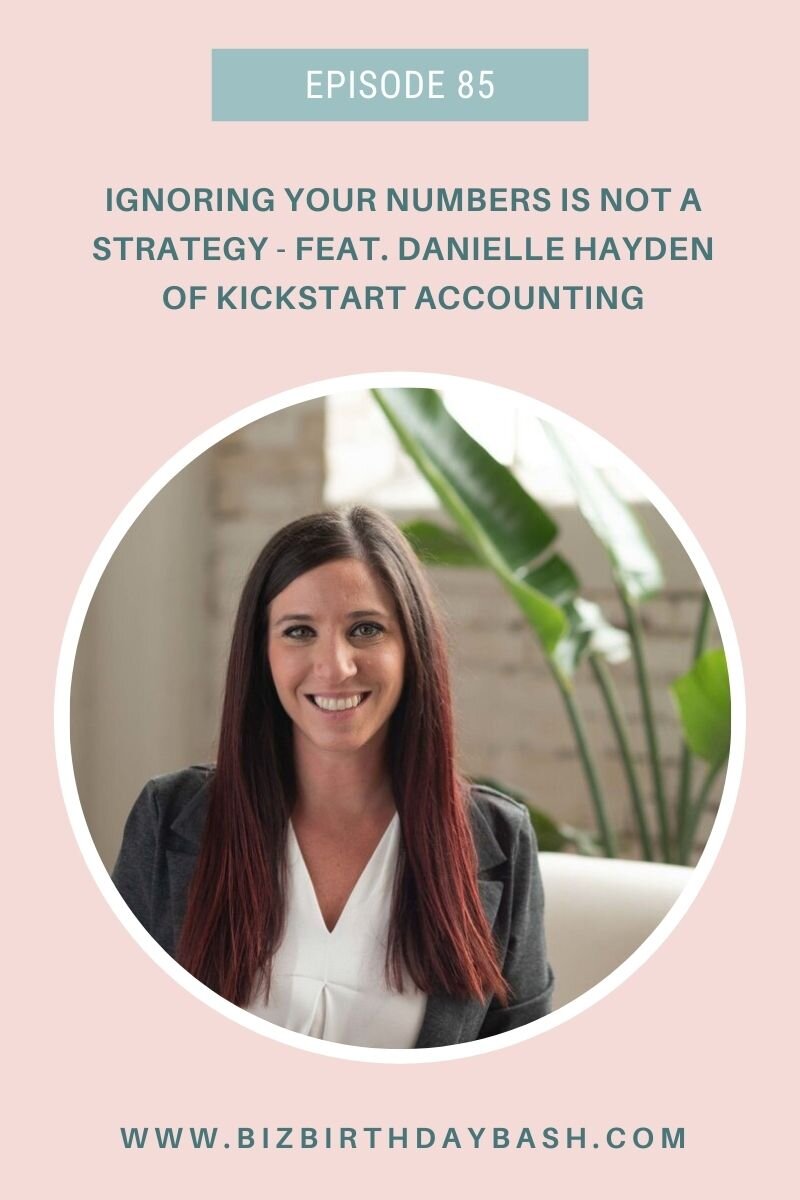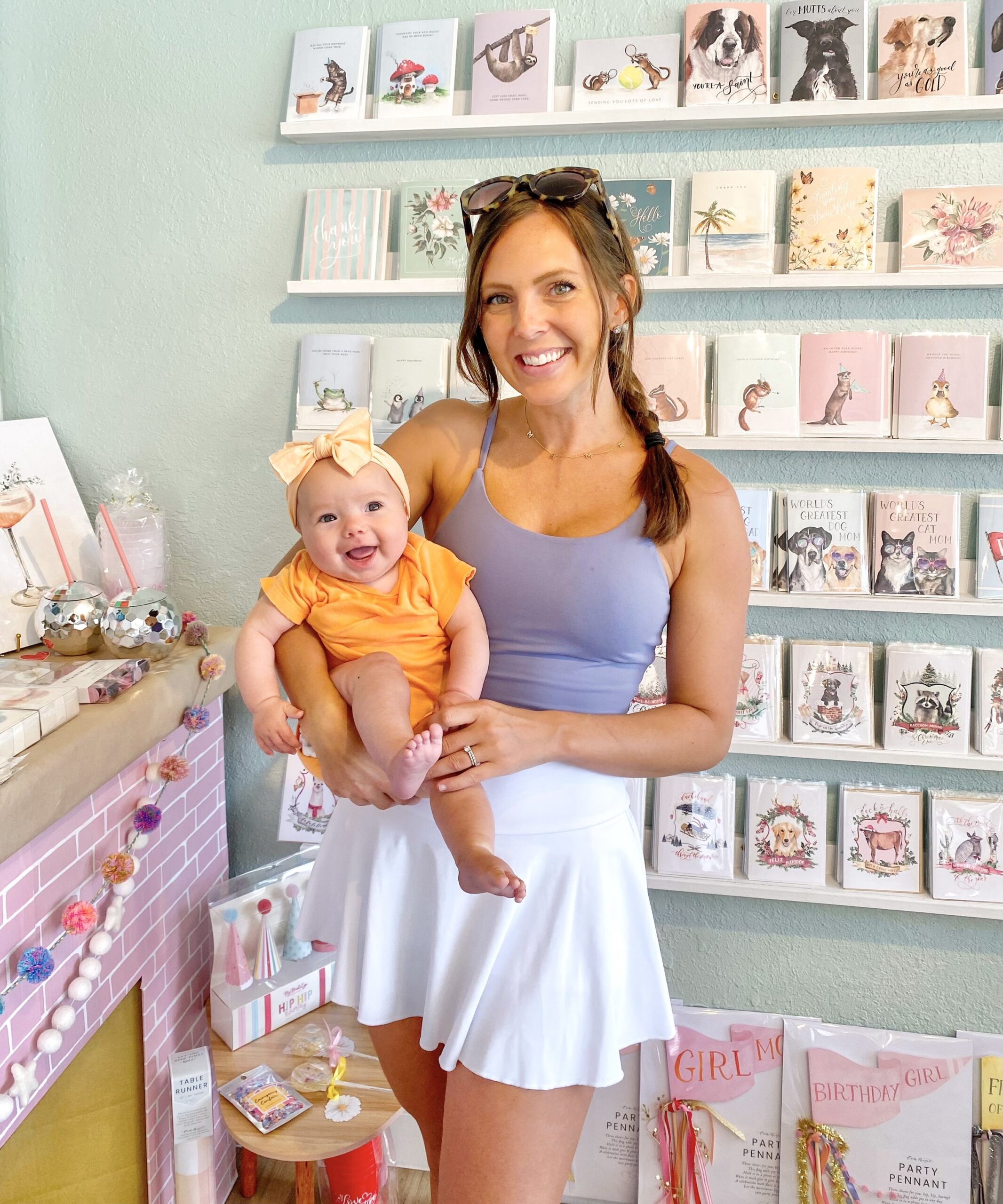Do you avoid looking at the numbers in your biz? If so, today’s episode is for you! Listen in as we chat with Danielle Hayden of Kickstart accounting about how a healthy money mindset is the lifeblood of your business. Plus, don’t miss all of the bookkeeping tips that Danielle is sharing in this episode. She’s covering everything from how often you should be reviewing your numbers to managing the IRS heebie-jeebies.
Let’s be friends! Find us on Instagram http://instagram.com/bizbirthdaybash @bizbirthdaybash. For all show notes please visit http://www.bizbirthdaybash.com/podcast
Grab your FREE Training — 4 Essentials You Need to Turn Your Biz into a Profit Party: https://bizbirthdaybash.com/free-training
Have you always been in accounting? Tell us about your journey to founding Kickstart Accounting and how you got here today!
Danielle (2:53)
So I did not start off as an accountant. I actually started off as a hairdresser. So I worked in several different salons and spas. But I had a knack for numbers. So when I worked in those salons, I loved looking at, okay, how many? How many haircuts? What do I need to do? How many colors do I need to do? How many highlights do I need to do? How many pedicures or facials? Do I need to get to reach the next commission structure? And then when I became a manager of the salon, okay, what does each member of my team need to do for us to be the top store. And you know, it was always numbers focused. I didn’t realize that at the time that I had a knack for that. I just, I loved what I did.
However, I took on I was going to school for business management, I wanted to open up my own hair salon eventually. And I decided to take this internship in accounting. And that’s actually where I met my business partner. We interned down at the Cleveland Indians, the baseball team here in Cleveland, Ohio. And I absolutely fell in love with the accounting process. I know that sounds crazy. But it was so black and white and clear and quiet. And I just fell in love with the process.
From there, I switched majors and within a few years, was full second into my accounting career, a little bit of a different path for most accountants. I knew I didn’t want to do tax. I knew I loved the business side of accounting. So in business in accounting terms of the accounting world, that’s called corporate accounting. So I went into what we call corporate accounting, where I went into mid-sized businesses and I worked in their accounting department, helping them with their accounting processes, and then ultimately became a CFO where I grew the strategy part of the business. All of that was just like, every single step of that journey was just perfectly aligning me to do what I do today. Like, as I’m repeating those steps, I’m like, gosh, it really is like, wow, I use that experience in the salon and those metrics to help other businesses use that in their business, you know, working those internships and going from the ground up, I was able to pull experiences from each and every one of these experiences to be able to transform entrepreneurs today.
Why are small biz creatives afraid to look at their numbers?
Danielle (7:29)
You know, I call it the report card effect. So think about in school, right? When we were all growing up, we got a report card. And if you got an A, you’re doing good. And if you got an F, you got grounded. Now as entrepreneurs, you get this financial statement, and it tells you, did you grow? Did your revenue go up? Did your revenue go down? Did you spend more money? Do you not spend enough money? If you’re not making a profit, then Shame on you for not making a profit. And there are so many gurus out there who saying you have to make this much money, you shouldn’t be here, you should be there. And it feels like the report card effect. I think it can be beneficial, right? Like, okay, I am getting this report card. Now I know what needs to be changed. And I could use it as a toolkit to get better. But when we think about our experiences when we were younger, it wasn’t like, Oh, you know, I know for my son, I’m not like, Oh, honey, you got a D? That’s our opportunity. Like, shame on you. You didn’t try hard enough. So I think that’s a big part of where that comes from.
How often should we be reviewing our numbers and balancing (reconciling) our books?
Danielle (9:02)
So the ideal situation is monthly. So we do have some clients who get a weekly dashboard. It’s more of a cash report like what’s my cash? who owes me money? Who do I owe money to? So our higher-level clients get a weekly dashboard, then we have our ideal timing is monthly. And then if you can’t do it monthly, at least quarterly? When you do it quarterly, the least gives you four opportunities per year to make changes. am I spending too much? Am I not spending enough and reinvesting in my business? And do I have enough saved for my taxes, and then make any changes to your spending to take advantage of the tax opportunities? So monthly, or quarterly? for anybody who’s not familiar with the term reconcile? or looking at numbers at all right? Like, a lot of people say to me, Well, what the hell is looking at my numbers mean, right? Let me know what that means. In your Accounting profile in your accounting software, there’s a ton of them out there, there’s zero QuickBooks wave. If you’re not in accounting software yet, this is your reminder that Google Sheets and Excel is not going to be an efficient tool long term. In order for you to step into the CEO role of your business and really to up-level, you’re going to need an accounting software, eventually, you’ll need to be there, it’s time to do it. Now, once you’re in that accounting software, you’ll process all your transactions. And at the end of the month, reconciling is the tool within the software to make sure that you have everything included. And make sure everything is correct.
What accounting software are you most familiar with and recommend to your clients or prefer your clients to use?
Danielle (11:55)
So we still prefer QuickBooks Online. That’s our preferred software, not because it has a reconciling feature. I just like their reports, and their report formats, and the advanced reporting that they have, a lot of business owners will tell me, well, I’m never gonna need that report gonna need it, you know, it might be outside of your view right now. But I believe that every single one of my clients has the ability to really grow and scale their business. And eventually, they’re going to be glad that they have all that historical data in the system. In 235 10 years, they can say, Hey, can you run a report for the last five years, and QuickBooks can handle that type of reporting. So that’s why I like QuickBooks. However, we have a lot of clients and zero, and that’s the same thing as GoDaddy, where they don’t have a reconciling feature. But what we do for those clients is we still get their PDF statements at the end of the month. And we say, all right, does the bank balance match the book balance, the balance is zero. And then, you know, zero does have its own set of reports. So I don’t think that that’s a deal-breaker just because they can’t reconcile. I think the reporting is more of an issue like wave Freshbooks, some of these newer platforms that are trying to compete in the accounting software space, but they do something else, like fresh books, their specialty is invoicing, but they’re trying to compete in the accounting software space. They just don’t have all the reporting features that a system like QuickBooks has.
Let’s talk about having a positive money mindset… how does this impact a business owners success on a day to day basis? Can mindset be a downfall when it comes to money and money management?
Danielle (33:15)
Yeah, I mean, think about it, if you don’t have the right money mindset, if you’re scared to look at your finances, if you’re not willing to look at the information, you could potentially be putting your business in jeopardy in the people that you work with in jeopardy. We worked with a client a few years ago who she had decided to launch a new service. And in order for her to have that service, she needed to bring on several other contractors, they would give her an upfront quote. And then she would be she was like the head person, right. She was the person bringing in the clients. And so she was the one billing the client collecting the money from the client, but then she was paying the contractors super successful. If you only looked at her point of sale system, she was killing it. She had like quadrupled her revenue. And we’re seeing income she has never seen before. However, because we were sending her financials at the end of every month, she was seeing that her expenses were going up and her credit card balances were going up and she had less and less cash. Well, what was happening was that the contractors were going over their hours, not her fault and that the contractors fault just natural going over scope. But so she launched that in January, and she decided in August that she was closing that service line. She’s like had I not been looking at my numbers. Had I not known that this was draining me financially. I potentially would have kept ongoing for years and put my family in harm’s way because I was taking on so much debt so She was able to approach this with confidence, right? When she wrote that email saying she was closing that service line, she did it with confidence, and a positive money mindset, because she knew that she was going to go back to concentrating on the profitable service lines in her business. And that was going to be the growth of her business, not taking on something that had high gross revenue, but very low profit.
Should business owners strive to run a business debt-free? When (and when not) should we be borrowing money to help our business grow?
Danielle (38:25)
Yeah. You know, it’s interesting, I had a few clients who read the Dave Ramsey books, and so I recently read it, and he believes in no debt whatsoever. And I kept going through the book thinking, gosh, I agree with 90% of what you’re saying except for debt. I think it’s okay. You know, for me, I think there’s a risk-return, I think that you have to, you know, again, plan the investment, why are you taking on the debt? Why don’t you have enough cash? If you take on that debt? how, you know, when can you expect to pay it back and have a return? I think one thing that 2020 has taught us all is that we need to have some cash reserves. So I think that we should all strive to have three to six months worth of expenses. So run your profit and loss statement for the last 12 months. Look at what your average monthly expenses are, and then multiply that by three or six. And that’s how much money you should have in savings. If you have that much money in savings, and then you want to invest in something, I think it’s perfectly fine to take on that that again, it let’s go back to our money mindset stories, though. Maybe you grew up in a family that had a ton of debt problems. And so you are more risk-averse like you don’t, you don’t want to take on debt because you’re afraid you’re not going to make it back out. Then maybe for you your mindset in your business, you’ll be able to keep a better, more positive mindset if you don’t ever take on that debt. Or you had previous business experiences, whatever it might be your mindset story is, yes, I can use debt as a tool to accelerate, then it’s not going to affect your money mindset than having that debt isn’t going to bring you down. So I think you need to kind of check your mindset before you decide whether or not you want to take on that risk.
How “afraid” should we be of the IRS? What happens if we do something wrong or file some paperwork incorrectly?
Danielle (44:41)
I think that there is a happy medium. I think that you need to be afraid enough to find good people. If you don’t have good bookkeeping processes in place. Then when you go to give your tax accountant the information it might not be right. If you don’t Have a good tax accountant filing your tax return, they could either input something wrong, they could not be doing checks and balances for you, you could end up being audited if you don’t have the right team in place. So the number one thing I would say is get the right people around you. And then you don’t need to be afraid, because you know that it’s being done correctly, because you have the right team. You know, in all in the six years I’ve been in business we’ve had we’ve seen one person get audited. And I think you also need to have checks and balances and how much you’re taking advantage of business expenses. The IRS doesn’t want people taking their entire family on vacation, and then claiming as a tax deduction, that damage and that makes you a red flag. So I think, you know, get the right team, and then be reasonable. And I’m not saying don’t ever take a business expense. By all means, if you fly to Florida for our conference, but your family meets you there, your flight is still a business expense, you went for a conference, just don’t deduct most of your family’s airfare. Yes. Be reasonable. So I think let’s not try to take advantage of our businesses. But don’t be so afraid that you don’t take the business expenses that you should. And when in doubt, that good team you have in place call and ask them, you know, get a team that you don’t mind talking to.
Tell us about your biggest “uh oh” moment in business! It can be financially related or not!
Danielle (48:29)
I think our biggest moment, was waiting to hire. We were growing and growing. And we knew that we needed team members. And we kept on pushing it off. Because we were scared to spend the money. Even when you know the numbers and your accountants, you still get scared. And because I’m putting it off, and then by the time we hired our first employee, we needed her so bad, but we were scared to let go of the reins and let her just take control. So that we tried to stay involved and be the face client. And it just caused so much stress and time issues and bottleneck issues. And it took us a long time to get through that period. And I think really actually hindered our growth at the beginning of our firm. Getting out of the way of our team has been the best thing that we’ve ever done. I’m so proud of the team that we have today. And I encourage them to uplevel now and be with clients and grow and succeed and I like my Oh moment was waiting to get there and not doing that sooner.








+ show Comments
- Hide Comments
add a comment